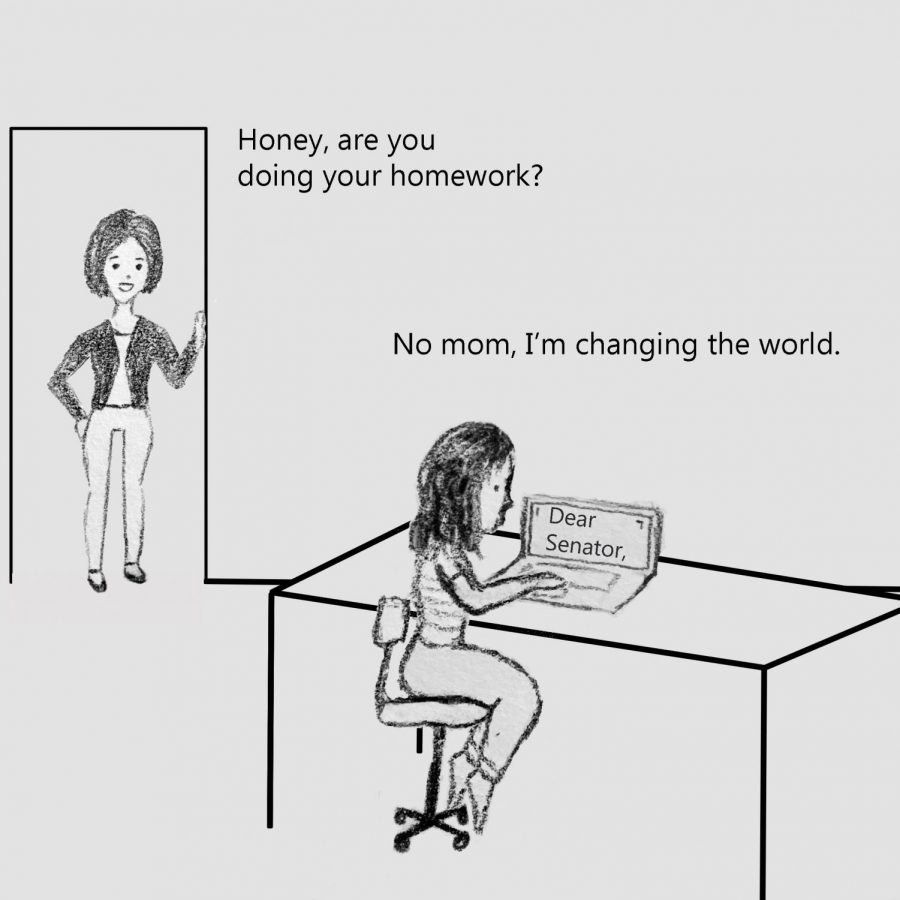It is our generation’s time to lead change
As students who are too young to vote, it’s easy to feel closed off from the world of politics. Even though we can follow local and national news, form opinions and debate with peers, our voices often feel futile in a political landscape dominated by adults. The students from Marjory Stoneman Douglas High School in Parkland, Fla., however, have proven that teenagers can catalyze political change without ever filling out a ballot, and reaffirmed that need for us, as students, to involve ourselves in political events.
Since a tragic shooting at their school left 17 dead, students from Stoneman Douglas have advocated relentlessly for gun control reform, orchestrating a nationwide movement with a force that no other campaign has achieved. By debating with politicians, challenging the National Rifle Association, organizing marches, writing op-eds and galvanizing support on social media, the students are breaking through a stalemate in the gun-control debate that has plagued the nation for decades.
These students’ remarkable initiatives have already paid off, as the Florida state legislature passed a major gun control bill, and their effort is not yet complete. The students are an inspiration to teenagers across the nation, having crushed the notion that only adults can make a tangible impact in politics. As students, we should follow their lead and search for ways in which we, too, can amplify our voices.
This is easier said than done, of course, but we don’t have to organize nationwide marches to make valuable political contributions.
The most important aspect of political activism is being engaged in current events. Following the news allows us to develop our own opinions on political matters, which in turn allows for productive debates with peers. Also, knowing the nuances of various political, social and economic issues helps us understand how to properly act on them. We must be informed in order to be involved.
There are countless ways to consume the news. Reading the newspaper, whether in print or online, gives comprehensive insight into local, national and global events, while daily news briefings on radio stations such as NPR or WTOP are convenient during morning car rides. Furthermore, many reliable news organizations such as the Washington Post, New York Times and CNN have available content on Twitter, Facebook and Snapchat.
As students, the best way to have a tangible political impact is to focus on local politics, which is far more accessible than national affairs. This could involve calling or writing letters to local politicians in order to express concern, make suggestions, learn more about what they are doing or praise their actions.
As students, we are lucky to spend every day with people of differing political opinions. That means that we have a unique opportunity to engage in tough political conversations with our friends or fellow students. Even though such conversations can seem uncomfortable, they are actually a great way to tackle serious political issues while expanding your knowledge and improving your speaking skills. This is a resource that many adults are not lucky enough to have, and we should take advantage of it.
Stereotypes dictate that teenagers are lazy, apathetic and self-centered; that we not only can’t bring about political change but we don’t even want to. The students from Stoneman Douglas have proven these stereotypes to be wrong, and we must continue to prove them wrong with our actions. We should find areas that we care about and act on them because even small actions can make a difference. Stoneman Douglas was a wakeup call, but we cannot continue to wait for more tragedies as our only motivator to get involved. We have proved that teenagers can make a difference; now we need to show that such a difference can last.
This editorial was featured in the Volume 35, Issue 5 print edition of The Lion’s Tale, published on March 22, 2018.




